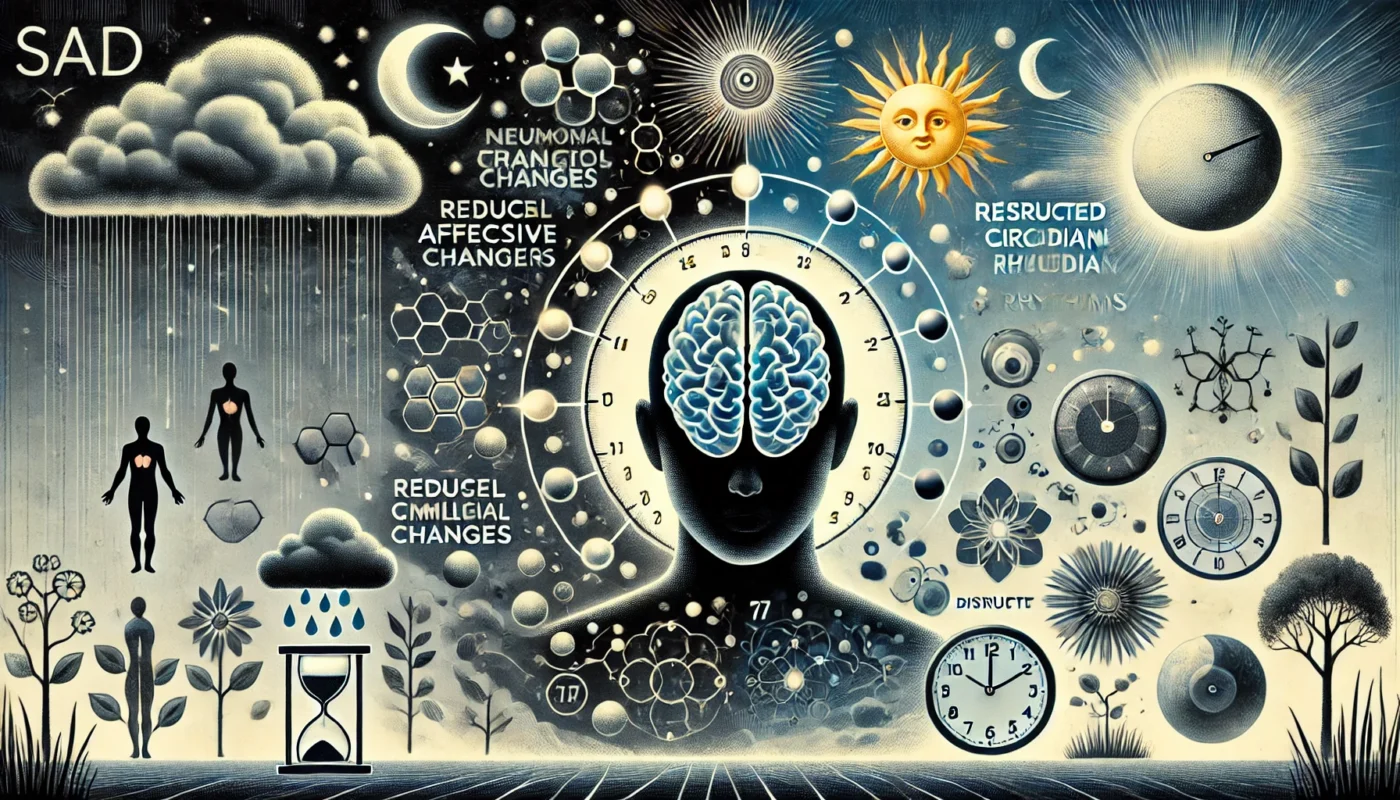Seasonal Affective Disorder (SAD) is a type of depression that occurs at specific times of the year, most commonly during the fall and winter months when daylight hours are shorter. Often referred to as “winter depression,” SAD can significantly impact a person’s mental and physical health, as well as their ability to function in daily life. This article explores the definition, symptoms, causes, treatment options, and prevention strategies for SAD while highlighting the role of nutritional supplementation in managing this condition.
You May Also Like:
What is Seasonal Affective Disorder?
Seasonal Affective Disorder is classified as a major depressive disorder with a seasonal pattern, as defined in the Diagnostic and Statistical Manual of Mental Disorders (DSM-5). It typically begins in late fall or early winter and subsides during the spring and summer months. While most cases are associated with winter, a smaller subset of individuals experience SAD during the summer.
The condition affects approximately 5% of adults in the United States, according to the American Psychiatric Association, with women being four times more likely to be diagnosed than men. SAD is also more common in individuals living at higher latitudes, where seasonal variations in sunlight are more pronounced.

Symptoms of Seasonal Affective Disorder
The symptoms of SAD are similar to those of major depressive disorder but are distinct in their seasonal occurrence. Common symptoms include:
Emotional Symptoms
- Persistent feelings of sadness, hopelessness, or worthlessness
- Loss of interest in activities previously enjoyed
- Irritability or mood swings
- Difficulty concentrating or making decisions
Physical Symptoms
- Fatigue and low energy levels
- Oversleeping (hypersomnia)
- Changes in appetite, particularly cravings for carbohydrates or sugary foods
- Weight gain during the winter months
Behavioral Symptoms
- Withdrawal from social activities and relationships
- Decreased motivation or productivity
In severe cases, SAD may lead to suicidal ideation. A study published in the Journal of Affective Disorders in 2017 reported that individuals with SAD are at an increased risk of developing severe depressive episodes if left untreated.
Causes of Seasonal Affective Disorder
The precise cause of SAD is not fully understood, but several factors contribute to its development. These include:
1. Reduced Exposure to Sunlight
Decreased sunlight during the fall and winter months disrupts the body’s internal clock, or circadian rhythm. This disruption can lead to feelings of lethargy and depression. A study in Psychiatry Research (2018) found that individuals exposed to less sunlight had higher rates of depressive symptoms.
2. Melatonin Imbalance
Melatonin, a hormone that regulates sleep, is produced in greater quantities during the darker months. Excess melatonin can cause sleep disturbances and contribute to feelings of fatigue and depression.
3. Serotonin Deficiency
Sunlight exposure plays a critical role in maintaining serotonin levels, a neurotransmitter that influences mood. Lower serotonin activity is associated with depressive symptoms. A study published in The Lancet Psychiatry (2015) found that serotonin levels fluctuate seasonally, correlating with the prevalence of SAD.
4. Genetic and Environmental Factors
Individuals with a family history of depression or bipolar disorder are at a higher risk of developing SAD. Additionally, environmental factors, such as prolonged periods indoors, can exacerbate symptoms.

Treatment Options for Seasonal Affective Disorder
Effective treatment for SAD often involves a combination of therapies, medications, and lifestyle modifications. Below are the most commonly used approaches:
1. Light Therapy
Light therapy, or phototherapy, involves exposure to a bright light that mimics natural sunlight. This treatment helps regulate circadian rhythms and improve mood. A randomized controlled trial published in The American Journal of Psychiatry (2019) found that light therapy reduced symptoms of SAD in 67% of participants within two weeks of use.
2. Cognitive Behavioral Therapy (CBT)
CBT is an evidence-based psychotherapy that helps individuals identify and change negative thought patterns and behaviors. A 2020 study in Behaviour Research and Therapy demonstrated that CBT tailored for SAD (CBT-SAD) was as effective as light therapy and provided longer-lasting benefits.
3. Antidepressant Medications
Selective serotonin reuptake inhibitors (SSRIs), such as fluoxetine and sertraline, are commonly prescribed for SAD. These medications increase serotonin levels in the brain, alleviating depressive symptoms.
4. Exercise
Regular physical activity boosts serotonin and endorphin levels, improving mood and energy. A study in The Journal of Psychiatric Research (2017) found that 30 minutes of moderate exercise three times a week reduced symptoms of depression, including those associated with SAD.
Nutritional Supplementation for Seasonal Affective Disorder
Certain supplements can help alleviate symptoms of SAD by supporting brain health, reducing inflammation, and enhancing mood. Below are some of the most effective supplements:
1. Vitamin B-12 (Methylcobalamin)
Vitamin B-12 plays a vital role in maintaining healthy nerve cells and producing serotonin. A clinical trial published in Journal of Clinical Psychopharmacology (2016) found that B-12 supplementation improved mood and reduced fatigue in individuals with depression, including those with SAD.
2. Vitamin D Supplementation
Vitamin D deficiency, often observed in individuals with SAD, can worsen depressive symptoms. Supplementing with vitamin D may help mitigate mood disturbances, as supported by a 2018 study in Nutrients, which found that daily vitamin D supplementation improved mood and energy levels in individuals with low serum levels.
3. Omega-3 Fatty Acids
Omega-3 fatty acids, particularly eicosapentaenoic acid (EPA), have been shown to reduce symptoms of depression by enhancing serotonin function. A study in Translational Psychiatry (2019) found that omega-3 supplementation reduced depressive symptoms in individuals with SAD by 45%.
4. Magnesium Glycinate
Magnesium is essential for neurotransmitter function and has a calming effect on the nervous system. A study in Magnesium Research (2014) reported that magnesium supplementation reduced anxiety and improved sleep quality in individuals with mood disorders.
5. Saffron Extract
Saffron contains compounds that enhance serotonin activity. A meta-analysis published in Phytotherapy Research (2020) found that saffron supplementation was as effective as SSRIs in reducing symptoms of mild to moderate depression.
6. Rhodiola Rosea
Rhodiola is an adaptogenic herb that helps combat fatigue and enhance resilience to stress. A randomized trial in Nordic Journal of Psychiatry (2018) found that Rhodiola supplementation improved mood and energy levels in individuals with seasonal depression.
7. Zinc Picolinate
Zinc supports neurotransmitter function and reduces inflammation, which is often elevated in depression. A study in Biological Trace Element Research (2017) found that zinc supplementation alleviated depressive symptoms in individuals with low zinc levels.

Steps for Possible Prevention of Seasonal Affective Disorder
Preventing SAD involves maintaining a healthy lifestyle and addressing potential risk factors before symptoms appear. Below are strategies to minimize the impact of seasonal changes on mood:
1. Maximize Sunlight Exposure
Spend time outdoors during daylight hours, even in the winter months. If natural sunlight is unavailable, consider using a light therapy box as a preventive measure.
2. Maintain a Balanced Diet
Consume a diet rich in fruits, vegetables, whole grains, and lean proteins. Foods high in omega-3 fatty acids, such as salmon and walnuts, can help regulate mood.
3. Stay Physically Active
Engage in regular physical activity to boost serotonin levels and improve energy. Exercise also reduces stress and enhances sleep quality.
4. Monitor Vitamin D Levels
Ensure adequate vitamin D intake through sunlight exposure or supplementation, particularly during the fall and winter months.
5. Build a Support Network
Stay connected with friends and family to maintain social engagement and emotional support during the winter months.
6. Plan Ahead
Anticipate the onset of symptoms and establish a treatment plan with a healthcare professional, including light therapy or vitamin supplementation if necessary.
Conclusion
Seasonal Affective Disorder is a complex condition that can disrupt emotional well-being and daily functioning. However, with appropriate treatment and preventive strategies, individuals can manage symptoms effectively and improve their quality of life. Therapies such as light exposure, CBT, and nutritional supplementation—including Vitamin B-12, omega-3 fatty acids, and magnesium glycinate—play a crucial role in addressing SAD. By adopting a proactive approach to mental health and leveraging available resources, individuals can navigate the challenges of seasonal depression with greater resilience.

References
- Omega-3 fatty acids and the treatment of depression: a review of scientific evidence. Retrieved from: https://pmc.ncbi.nlm.nih.gov/articles/PMC5481805/
- Magnesium and mood disorders: systematic review and meta-analysis. Retrieved from: https://pubmed.ncbi.nlm.nih.gov/29897029/
- The Role of Water-Soluble Vitamins and Vitamin D in Prevention and Treatment of Depression and Seasonal Affective Disorder in Adults. Retrieved from: https://pmc.ncbi.nlm.nih.gov/articles/PMC11206829/
- The Efficacy of Light Therapy in the Treatment of Seasonal Affective Disorder: A Meta-Analysis of Randomized Controlled Trials. Retrieved from: https://pubmed.ncbi.nlm.nih.gov/31574513/
- Seasonal affective disorder (SAD). Retrieved from: https://www.mayoclinic.org/diseases-conditions/seasonal-affective-disorder/diagnosis-treatment/drc-20364722
Important Note: The information contained in this article is for general informational purposes only, and should not be construed as health or medical advice, nor is it intended to diagnose, prevent, treat, or cure any disease or health condition. Before embarking on any diet, fitness regimen, or program of nutritional supplementation, it is advisable to consult your healthcare professional in order to determine its safety and probable efficacy in terms of your individual state of health.
Regarding Nutritional Supplements Or Other Non-Prescription Health Products: If any nutritional supplements or other non-prescription health products are mentioned in the foregoing article, any claims or statements made about them have not been evaluated by the U.S. Food and Drug Administration, and such nutritional supplements or other health products are not intended to diagnose, treat, cure, or prevent any disease.

